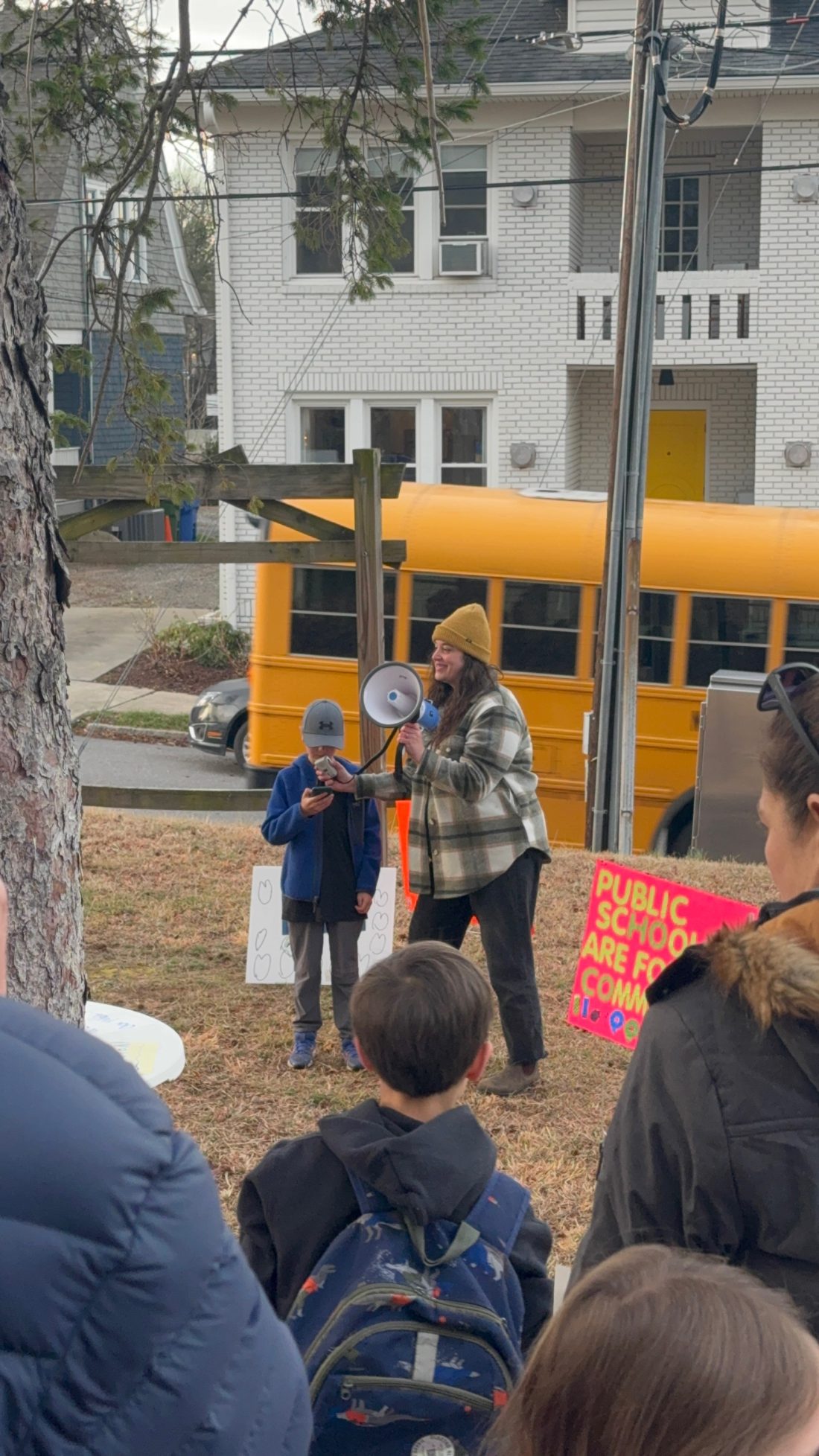It’s not often you see a grassroots campaign ask the government to raise taxes. But as Asheville City Schools (ACS) faces a nearly $7 million spending gap in next year’s budget, a recently formed parents group is taking matters into its own hands.
Families of Asheville City Schools (FACS), made up of parents from every school in ACS, has launched a Two Cents for AVL campaign lobbying the Buncombe County Board of Commissioners to raise the supplemental property tax rate for the district.
The increase, from 10.62 cents to 12 cents per $100 of taxable property value, would cost a property owner in the Asheville City Schools district whose property is appraised at $400,000 an extra $55.20 per year. There is no supplemental tax rate supporting Buncombe County Schools; taxes for county residents who don’t reside in the city schools district won’t be affected.
Proponents of the move include the teacher advocacy group Asheville City Association of Educators, district staff and the Asheville City Board of Education. They say the tax increase is important for maintaining a “no cuts” budget next year. This approach, they argue, is necessary after commissioners slashed spending for K-12 education by $4.7 million at their Jan. 21 meeting.
The reduction in the current year allotment — about 4% for each school district — got parents’ attention, says Christina Shimrock, who is spearheading the Two Cents campaign — FACS’ first action since launching in March.
“It really activated our community to make sure that the foundation of our public schools would remain strong. A huge piece of that, and the most important piece, is funding,” she tells Xpress.
‘Diet of rice and water’
During the Asheville City Board of Education’s April 7 budget work session, ACS Superintendent Maggie Fehrman presented a dire picture for board members to consider.
The three proposed budgetary options range from the district making no cuts to “surviving on a diet of rice and water,” according to Fehrman’s presentation.
The most conservative proposal, which was the only one that did not include increased revenue from the supplemental tax hike, includes eliminating nine full-time positions in the district’s central office, 13.5 instructional positions in schools and four media and district leadership team positions. Additionally, this proposal would limit hours for bus drivers, instructional assistants, nutrition staff and assistant principals. Fehrman said the district would be “starving” if left with this budget.
“None of those are great options,” she told the board.
The curtailed budget proposals are a result of the district facing about a $5 million reduction in revenue compared with the current school year and a $2 million increase in required spending for things such as increasing utility and insurance costs and state-required employee salary and benefit raises, Fehrman said. The drop in revenue is a result, in part, of decreasing enrollment and the district’s shrinking reserves, which were used to cover current year expenses after Tropical Storm Helene.
Of the three options, board members overwhelmingly supported option one, proposing no cuts to the current spending budget.
Several members, including George Sieburg, Pepi Acebo and Liza Kelly, said they’d like to see a more aspirational budget option that included funding for things they knew the district needed to work on, such as closing its achievement gaps and expanding early childhood education offerings.
“As it is, a no-cuts budget is less than bare bones,” Kelly said.
Timothy Lloyd, president of ACAE, attended the work session and said he was pleased that the board was so supportive of the district’s no-cuts budget, something the advocacy group has been lobbying for since the county announced its budget cuts in January.
“I am really, really heartened by the fact that many school board members said that there is no reason to even stop at option one and maybe ask [for more]. I really appreciate that coming from our board.”
The board was expected to vote Monday, April 21, on its preferred budget, which Fehrman will present to county commissioners on Friday, May 2.
Tax season
While school supporters see raising the supplemental tax rate as one of the only ways to recoup some lost funds after the storm, not all county commissioners agree.
Commissioner Al Whitesides, who previously served on the city school board and calls himself a supporter of public education, tells Xpress he does not support a supplemental tax hike, arguing the district needs to get more efficient.
He cited declining enrollment and a surplus of space in the district’s facilities as reasons the county shouldn’t raise taxes to give more funding to the schools at a time when county residents are struggling after Tropical Storm Helene.
Supporters of a higher tax rate have cited the declining rate, which decreased from 15 cents to 12 cents in 2017 and again to its current rate in 2021, as evidence the county should restore a higher rate.
But as Whitesides points out, those decreases both came during tax reappraisal years to maintain a “revenue neutral” rate so taxpayers wouldn’t pay more after an increase in their property values.
Meanwhile, Commissioners Jennifer Horton and Martin Moore voted against the county’s clawback of education funds in January and may be more amenable to the proposal. Horton has posted statements of support for increased school funding on social media in recent weeks.
Horton, Moore and Commission Chair Amanda Edwards could not be reached by deadline for this story.
Shimrock says she understands it’s politically difficult to raise taxes, but she is hopeful commissioners will hear that there is support from Asheville residents for the change. Yard signs supporting the campaign will go out in the coming weeks, she adds.
“We believe within the public school system that we have support among property owners. But we don’t get to vote, and so that’s why we have to roll out this campaign,” she says. “As families and parents, we really believe in Dr. Maggie’s vision to bring all stakeholders to the table in decision-making,” she notes.
Editor’s note:This story was updated April 21 to reflect a date change for the Buncombe County Board of Commissioners’ next budget work session. The meeting, which will include budget presentations from the county’s two school districts, is now scheduled for Friday, May 2 at 11 a.m.
This story was supported by the Fund for Investigative Reporting and Editing









